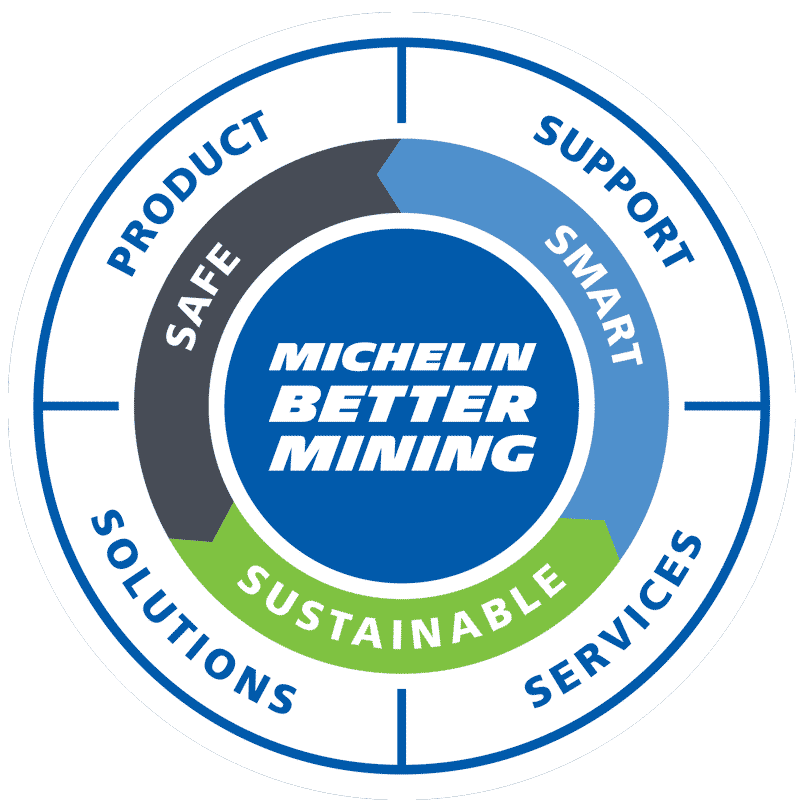
Michelin and mining sustainability
Our Commitment to Mining Sustainability
Michelin’s commitment to help miners advance towards a more sustainable future
Michelin aims to work collaboratively with miners to develop products, services, solutions and support that advance sustainable mining practices and aid in sustainable development. We believe that together we go farther and faster. Part of our sustainability commitment to you includes:
Sustainable mining offers – Part of Michelin Better Mining
The world is facing many large-scale, urgent challenges that impact human wellbeing and environmental health – global warming, overuse of natural resources, biodiversity loss, mass migrations and poverty.
Responsible companies understand their role in building a more planet-friendly future and are working toward decarbonization and sustainable development.
In most instances, more sustainable means more metals and minerals, which puts pressure on the mining industry to mine more responsibly and minimize the industry’s environmental and social impact.
For more than 30 years, the Michelin Group has been committed to reducing its environmental and social impact. That commitment extends to our role as a supplier to the mining industry.
We develop mining products, services, solutions and support for surface mines and underground mines that help miners operate safer, smarter and more sustainably, and work together to advance sustainable mining practices.
This commitment is our Michelin Better Mining approach.
Recycled or renewable materials
Michelin has laid out a sizeable challenge to integrate 100% recycled or renewable materials into our tires by 2050.
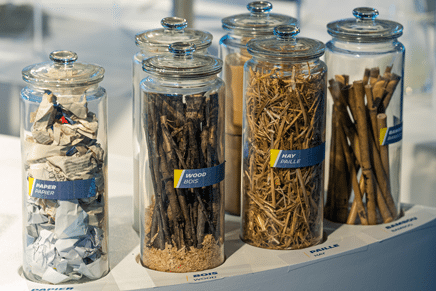
Renewable materials and recyclable materials for more eco friendly mining
A sustainable material is one that is either renewable, meaning derived from resources that are naturally replenished on a human timescale, or recycled – made from feedstock recovered from industrial waste that has been reprocessed into new products, materials or substances.
This commitment lowers Michelin’s dependence on finite raw materials and boosts our use of recycled waste to aid in a more circular economy. Using our expertise in high-tech materials and partnership with leading global companies in recycled and renewable materials, we are laying a roadmap to full circularity by 2050 without compromising the quality or performance of our products.
On our journey to greater sustainability, we have committed to incorporating 40% renewable or recycled material into our tires by 2030 and 100% by 2050.
Energy-efficient mining tires
Mining tires play an important role in helping mines reduce their environmental impact and aid in sustainable development. Energy efficiency and proper use of mining tires help vehicles consume less fuel and emit less CO2, and help miners lower production costs.
Michelin has a comprehensive portfolio of products, support, services and solutions that help miners operate safer, smarter and more sustainably.
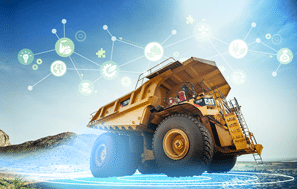
Michelin develops solutions to advance mining sustainability
For example, Michelin’s innovative tire pressure monitoring system – MICHELIN MEMS 4 – monitors the temperature and pressure of mining tires remotely and continuously to help mines boost fleet performance and improve mine safety.
Integrating a system like MICHELIN MEMS 4 into a site’s overall production planning enables mines to unify maintenance planning and optimize mining productivity. With this information, mines can quickly react to potential issues and improve employee safety, decrease unscheduled downtime and extend tire life.
Michelin uses Life Cycle Assessments to track and quantify the environmental impact of each stage of a tire’s life, from “cradle to grave”, including raw materials extraction, manufacturing, finished-goods shipments, use and waste. These insights equip our tire designers and product and service engineers with data needed to continually evolve and innovate products, services and solutions that advance mining sustainability without compromising product performance. 100% of Michelin’s products and services will be eco-designed by 2030.
Rolling resistance and motion resistance.
How do tires impact a mining truck’s energy efficiency and fuel consumption?
To fully understand the impact of tires on a mining vehicle’s energy efficiency, we need to start by understanding what impedes vehicle movement. This term is called rolling resistance. In the mining industry, where mining trucks run on hard and soft surfaces, it is also important to consider motion resistance when measuring energy efficiency. Mining tires sink into soft soil and may require even more power from the mining truck to move forward.
What’s behind these terms – rolling resistance and motion resistance – and what are the effects on a mining truck’s fuel consumption?
When a mining vehicle carries a load and operates on hard or soft ground, the tire deforms and flexes, which generates heat. This heat represents the loss of energy, causing the mining truck to work harder to move forward. By designing mining tires with better heat dissipation, the mining truck exerts less energy as it moves forward and consume less fuel and emits less CO2. Energy-efficient tires are an optimal way to help miners and mine operations advance sustainable development.
Read how Michelin mining uncovered opportunities to reduce a mine's CO2 emissions through a Life Cycle Assessment.
Rolling resistance and motion resistance are key to reduce a vehicle’s CO2 emissions and advance sustainable mining practices
CARS
Cars run on hard surfaces: 100% rolling resistance.
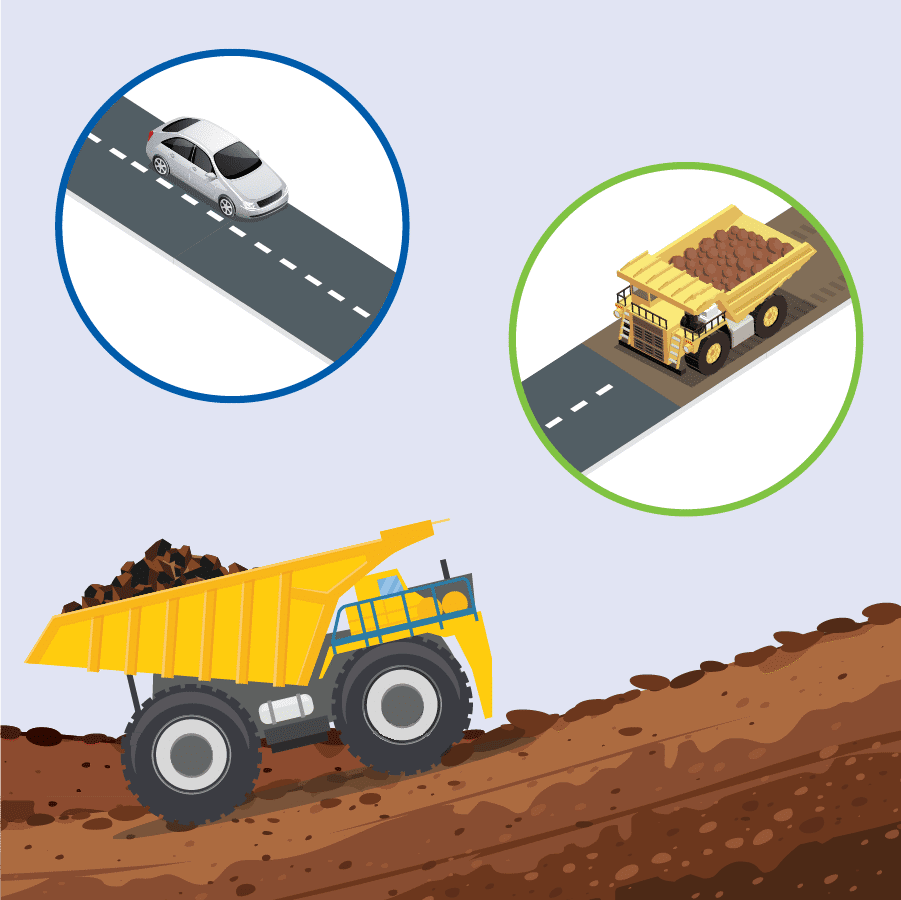
: Rolling Resistance and Motion Resistance are key to reduce a vehicle’s CO2 emissions and advance sustainable mining practices.
MINING TRUCKS
Mining trucks run on hard AND soft surfaces
On soft surfaces, tires sink in the soil and energy is necessary to propel the truck forward. That's motion resistance, which is equally important to measure for energy efficiency.
End-of-life mining tire Solutions
With the vision to work with and across customers to advance sustainable mining practices in mine sites, Michelin is identifying opportunities to collaborate with miners for greater sustainability and impact locally, including the establishment of recycling project teams in South America, West Africa, South Africa and Australia.
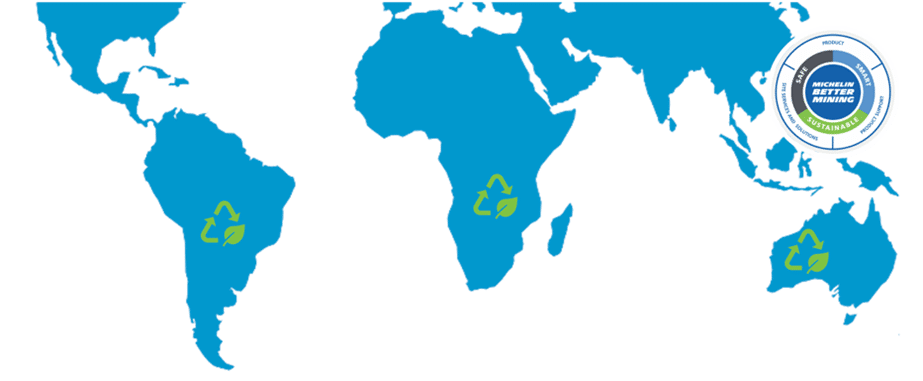
End-of-life tire solutions and local recycling project teams are some examples of sustainable mining that Michelin is pursuing.
Watch the video to learn about Michelin’s tire cutting and shredding facility in Antofagasta, Chile, a milestone in Michelin’s commitment to tire recycling.
Mining community wellbeing
As one of the world’s leading buyers of natural rubber, the Michelin Group is committed to making the industry more sustainable and beneficial for everyone. One of the biggest challenges in the natural rubber industry is how highly fragmented and complex it is: 85% of global natural rubber production originates from small farms with an average of two to three hecacres.
For several years, Michelin has been working with its suppliers to engage all players in the value chain to adopt the best social and environmental practices for sustainable development through a collaborative approach. Leveraging the digital solution RubberWayTM helps assess and map social and environmental risks. Based on the results, mitigation actions and capacity building projects are implemented to support small farmers in their sustainability journey.
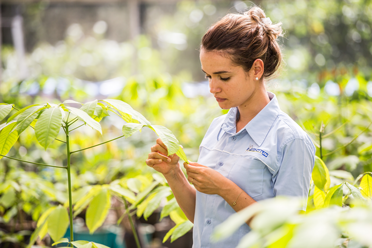
Michelin works to support the mining community and environmentally sustainable mining.
The ability of small farm owners to secure a decent livelihood while practicing good environmental and social practices is highly important.
Farmers often face livelihood challenges, such as limited access to agricultural training, income diversification options, and other skills. Michelin, its subsidiaries and joint ventures in West Africa, Brazil and Indonesia provide roughly 100,000 small farmers with training in agricultural practices to aid them in sustainable development.
For Michelin, sustainable natural rubber means upholding human rights, improving livelihoods and protecting forests and ecosystems. Michelin made a zero-deforestation commitment in 2015 and has led the transformation of the Natural Rubber industry through its ambitious strategy, actions and partnerships.
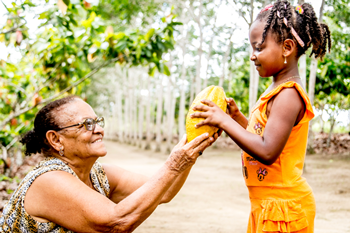
Michelin works to support the mining community and environmentally sustainable mining.
Sustainable mining partnerships
Michelin shares many of the same mining ESG priorities as our customers. We believe that together, if we combine talents and find synergies, we go farther faster to achieve mining sustainability. With this vision to collaborate and transform mining into a more sustainable future, we are working across the industry to identify opportunities to collaborate on sustainable mining practices for greater impact, including exploring engagement with organizations like the ICMM.
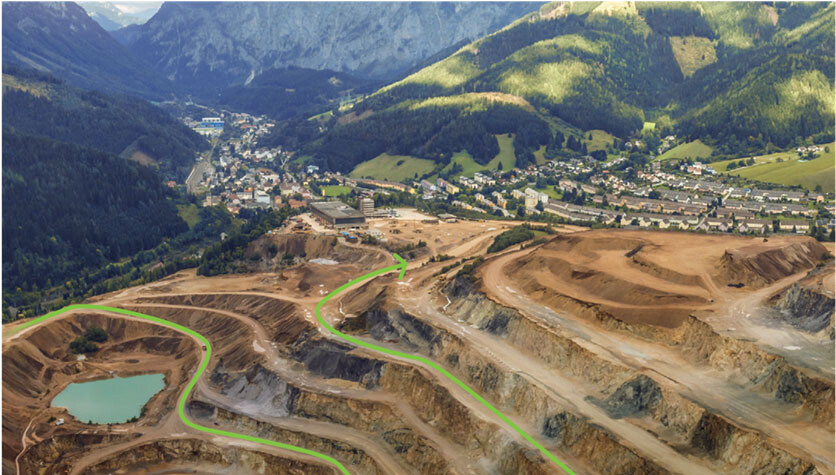
mining sustainability with michelin
SUSTAINABLE MINING FREQUENTLY ASKED QUESTIONS
Mining plays a critical role in the race to net zero. In fact, mining is the key factor in the way the world sources our solutions for a cleaner future. Without mining, we would be unable to have the precious materials that are necessary for the clean energy transition. Mining for materials such as lithium, copper, and nickel is essential for the creation of solar plants, wind farms, electric vehicle batteries, and more.
Mining is central to nearly every facet of our lives from construction to technology to mobility, and the demand for minerals and metals, especially those critical to the energy transition, is increasing. Miners must find the balance between benefits and impact for sustainable development, meaning there is a net positive contribution to people and the environment in addition to economic benefits. Sustainable mining is crucial to ensure we meet the demands of today without sacrificing the needs of tomorrow. w.
Through Life Cycle Assessments (LCAs), Michelin knows that the greatest environmental impact of the tire occurs while the tire is in use. Maintaining proper tire pressure and temperature of mining tires can help mining trucks reduce rolling resistance, thereby consuming less fuel, emitting less CO2, and lowering the costs of the mining operations. Further, Michelin uses its expertise in materials and matter to understand how a tire’s construction and compounds lend to greater energy efficiency for mining vehicles. A 10% gain in rolling resistance delivers generally 1 – 3% improvement in fuel consumption depending on usage.
Eco-design is a methodology for designing products and services that considers the environmental impacts from the very beginning – the design phase. At Michelin, we analyze the environmental footprint of a product or service at every stage of the life cycle based on 16 environmental factors across health, climate change, use of fossil-based resources and biodiversity. Eco-design works hand-in-hand with Life Cycle Assessments by aiming to mitigate a tire’s negative impact while preserving its qualities and performance. At Michelin, the eco-design process is multi-step, multidimensional and multidisciplinary as many different métiers in the company join forces to improve the design of a product or service. Michelin’s goal is for all its products and solutions to be eco-designed by 2030.
Discover Michelin mining’s comprehensive portfolio of products, services, solutions and support with, around and beyond tires designed to help you operate safer, smarter and more sustainably.
